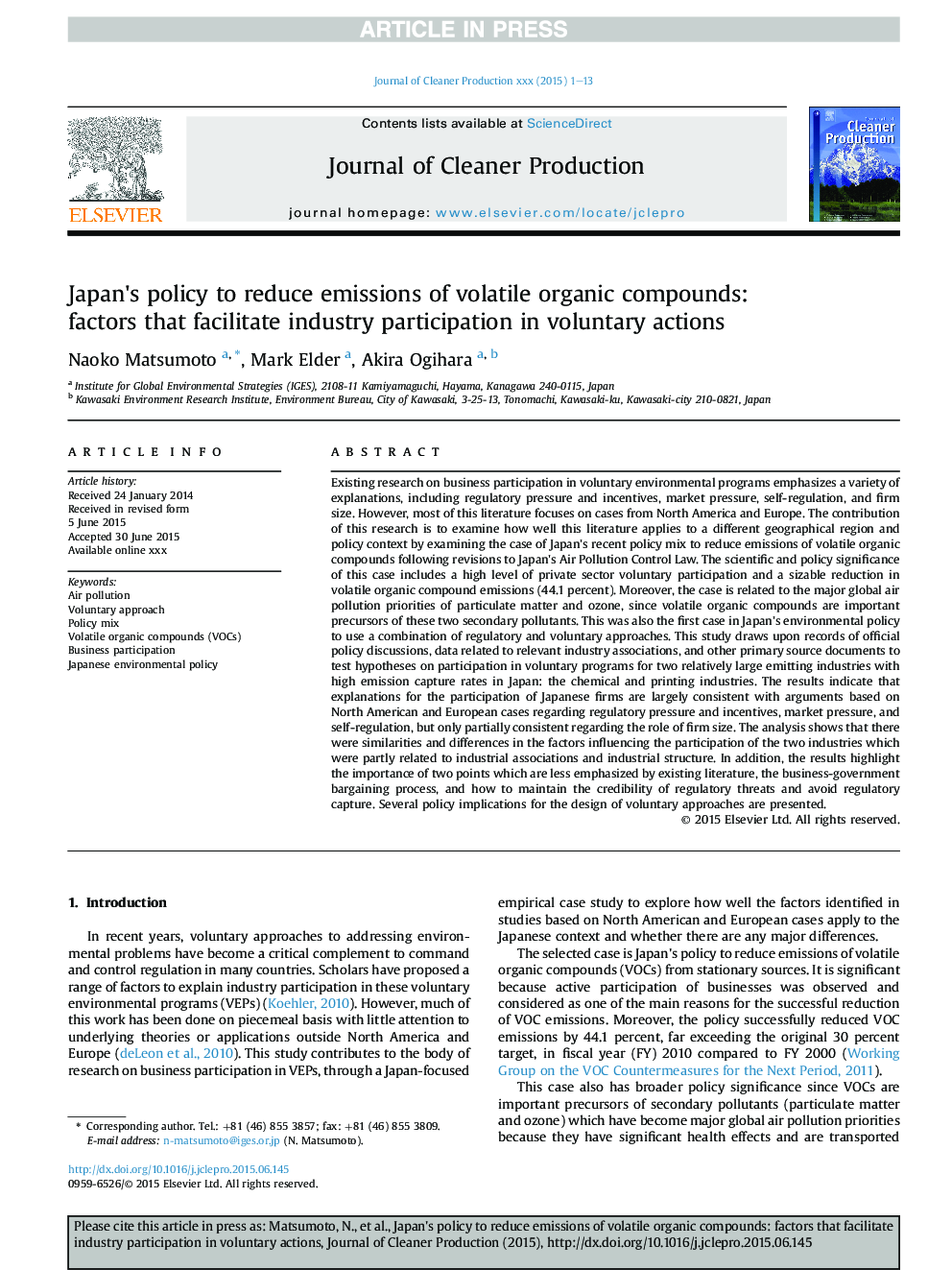| کد مقاله | کد نشریه | سال انتشار | مقاله انگلیسی | نسخه تمام متن |
|---|---|---|---|---|
| 10688222 | 1017980 | 2015 | 13 صفحه PDF | دانلود رایگان |
عنوان انگلیسی مقاله ISI
Japan's policy to reduce emissions of volatile organic compounds: factors that facilitate industry participation in voluntary actions
ترجمه فارسی عنوان
سیاست ژاپن برای کاهش انتشارات ترکیبات آلی فرار: عوامل موثر در مشارکت صنعتی در اقدامات داوطلبانه
دانلود مقاله + سفارش ترجمه
دانلود مقاله ISI انگلیسی
رایگان برای ایرانیان
کلمات کلیدی
ترجمه چکیده
تحقیقات موجود در مورد مشارکت تجاری در برنامه های داوطلبانه محیط زیست بر روی توضیحات مختلف، از جمله فشار و انگیزه های نظارتی، فشار بازار، خود تنظیم و اندازه شرکت، تاکید می شود. با این حال، بیشتر این مقاله به مواردی از آمریکای شمالی و اروپا متمرکز است. سهم این تحقیق این است که چگونه این ادبیات به یک منطقه جغرافیایی مختلف و زمینه سیاسی با توجه به مورد جدید سیاست ژاپن برای کاهش انتشار مواد مخدر آلاینده ناشی از اصلاح قانون قانون کنترل آلودگی در ژاپن تاکید دارد. اهمیت علمی و سیاستی این پرونده شامل سطح بالایی از مشارکت داوطلبانه بخش خصوصی و کاهش قابل توجهی در انتشار مواد آلاینده های آلاینده (44.1 درصد) است. علاوه بر این، این مورد مربوط به اولویت های عمده آلاینده های آلودگی هوا در ذرات جامد و ازن است، زیرا ترکیبات آلی فرار، پیشگیرنده های مهم این دو آلودگی ثانویه هستند. این اولین مورد در سیاست زیست محیطی ژاپن بود که از ترکیبی از رویه های نظارتی و داوطلبانه استفاده کرد. این مطالعه بر روی پرونده های بحث های رسمی سیاست، اطلاعات مربوط به انجمن های صنفی مربوطه و سایر اسناد اولیه برای تست فرضیه ها در مورد مشارکت در برنامه های داوطلبانه برای دو صنعت نسبتا بزرگ تولید کننده با نرخ جذب انتشار بالا در ژاپن: صنایع شیمیایی و چاپی. نتایج نشان می دهد که توضیحاتی برای مشارکت شرکت های ژاپنی عمدتا با استدلالات مبتنی بر موارد آمریکای شمالی و اروپایی در مورد فشار و انگیزه های نظارتی، فشار بازار و خود تنظیم است، اما تنها در مورد نقش اندازه شرکت سازگار است. تجزیه و تحلیل نشان می دهد که شباهت ها و تفاوت ها در عوامل موثر بر مشارکت دو صنایع وجود دارد که تا حدی مربوط به انجمن های صنعتی و ساختار صنعتی است. علاوه بر این، نتایج اهمیت دو نکته را برجسته می کند که توسط ادبیات موجود، روند چانه زنی کسب و کار و چگونگی حفظ اعتبار تهدیدات نظارتی و جلوگیری از گرفتن حق ثبت اختراع، تأکید می شود. مفاهیم متعددی برای طراحی رویکرد داوطلبانه ارائه شده است.
موضوعات مرتبط
مهندسی و علوم پایه
مهندسی انرژی
انرژی های تجدید پذیر، توسعه پایدار و محیط زیست
چکیده انگلیسی
Existing research on business participation in voluntary environmental programs emphasizes a variety of explanations, including regulatory pressure and incentives, market pressure, self-regulation, and firm size. However, most of this literature focuses on cases from North America and Europe. The contribution of this research is to examine how well this literature applies to a different geographical region and policy context by examining the case of Japan's recent policy mix to reduce emissions of volatile organic compounds following revisions to Japan's Air Pollution Control Law. The scientific and policy significance of this case includes a high level of private sector voluntary participation and a sizable reduction in volatile organic compound emissions (44.1 percent). Moreover, the case is related to the major global air pollution priorities of particulate matter and ozone, since volatile organic compounds are important precursors of these two secondary pollutants. This was also the first case in Japan's environmental policy to use a combination of regulatory and voluntary approaches. This study draws upon records of official policy discussions, data related to relevant industry associations, and other primary source documents to test hypotheses on participation in voluntary programs for two relatively large emitting industries with high emission capture rates in Japan: the chemical and printing industries. The results indicate that explanations for the participation of Japanese firms are largely consistent with arguments based on North American and European cases regarding regulatory pressure and incentives, market pressure, and self-regulation, but only partially consistent regarding the role of firm size. The analysis shows that there were similarities and differences in the factors influencing the participation of the two industries which were partly related to industrial associations and industrial structure. In addition, the results highlight the importance of two points which are less emphasized by existing literature, the business-government bargaining process, and how to maintain the credibility of regulatory threats and avoid regulatory capture. Several policy implications for the design of voluntary approaches are presented.
ناشر
Database: Elsevier - ScienceDirect (ساینس دایرکت)
Journal: Journal of Cleaner Production - Volume 108, Part A, 1 December 2015, Pages 931-943
Journal: Journal of Cleaner Production - Volume 108, Part A, 1 December 2015, Pages 931-943
نویسندگان
Naoko Matsumoto, Mark Elder, Akira Ogihara,
